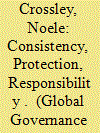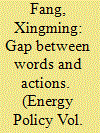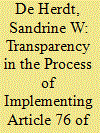|
|
|
Sort Order |
|
|
|
Items / Page
|
|
|
|
|
|
|
| Srl | Item |
| 1 |
ID:
174655


|
|
|
|
|
| Summary/Abstract |
Selective humanitarianism, it has been argued, may be condonable, or even preferable. Several arguments have been proffered in support of these views. This article revisits these arguments in light of the emergence of a discourse of protection and responsibility that now incorporates a wider spectrum of protection measures available to agents, of which armed intervention is but one. Consistency is an essential characteristic of ethics and the law—inconsistent practice diminishes the prospects of the development of norms of protection and associated practices and institutions. Furthermore, inconsistent practice means that fewer people receive protection from egregious violations of human rights. If the principles associated with human protection and humanitarianism are to become established norms of international society, international policy must be coherent, and international practice must be consistent.
|
|
|
|
|
|
|
|
|
|
|
|
|
|
|
|
| 2 |
ID:
175911


|
|
|
|
|
| Summary/Abstract |
With the increasing concern about energy sustainable policies, the words (willingness) and actions (behavior) of residents to support the renewable energy development have attracted lots of attention. However, most current studies focused on the willingness or behavior separately, ignoring the consistency between them. Given the wide gap between consumers' actual behavior and their willingness to support renewable energy found by a national energy survey in 2016, this paper aims to empirically explore the factors influencing the consistency between the willingness and behavior of Chinese residents through a bivariate-probit model. The empirical results indicate that socio-economic factors, socio-demographic factors and subjective factors have significant influences on residents’ consistency to support renewable energy development. Among them, subjective factors play the most important role. When the full sample is divided into a rural group and an urban group, it shows that income, education and energy supply satisfaction have more impacts on rural residents, while environmental concern and carbon emission knowledge affect urban residents by a larger magnitude. This paper provides important policy implications on how to guide residents willing to support renewable energy to take real actions in their life.
|
|
|
|
|
|
|
|
|
|
|
|
|
|
|
|
| 3 |
ID:
192917


|
|
|
|
|
| Summary/Abstract |
South Africa has served as an elected African member of the United Nations Security Council (UNSC) three times: in 2007–2008; 2011–2012; and 2019–2020. This article grapples with South Africa’s role as an active, voting participant on the UNSC during its third term, with reference to its previous UNSC tenures. Using a three-step model of voting behaviour analysis, the article highlights aspects of South Africa’s international peacekeeping obligations that interested observers have placed considerable value on, to determine its consistency in acting upon its declared foreign policy. This includes the Republic’s role in bringing the UN and African Union (AU) peace and security structures closer together and its efforts in strengthening the women, peace, and security (WPS) agenda. The study finds that the Republic has consistently built on its memory from its previous two terms, and its failures and successes, enabling it to utilize its third term in the most optimal way possible to meet its multilateral foreign policy goals.
|
|
|
|
|
|
|
|
|
|
|
|
|
|
|
|
| 4 |
ID:
187406


|
|
|
|
|
| Summary/Abstract |
The lack of transparency in the work of the Commission on the Limits of the Continental Shelf constitutes a major issue for both submitting and third states. In this respect, a careful reader of the reports of UNCLOS Meeting of the States Parties would not fail to discern the constant calls for transparency in the work of this body. While much has already been said on the transparency/confidentiality issues in the work of the Commission, new issues have emerged, such as the question of transparency in the internal relationship between the Commission and its subcommission. Prompted by this observation, this article discusses the process of implementing Article 76 of UNCLOS through the prism of transparency, opacity, and confidentiality, with a particular focus on the instances of disagreements between the subcommission and the Commission in plenary.
|
|
|
|
|
|
|
|
|
|
|
|
|
|
|
|
|
|
|
|
|